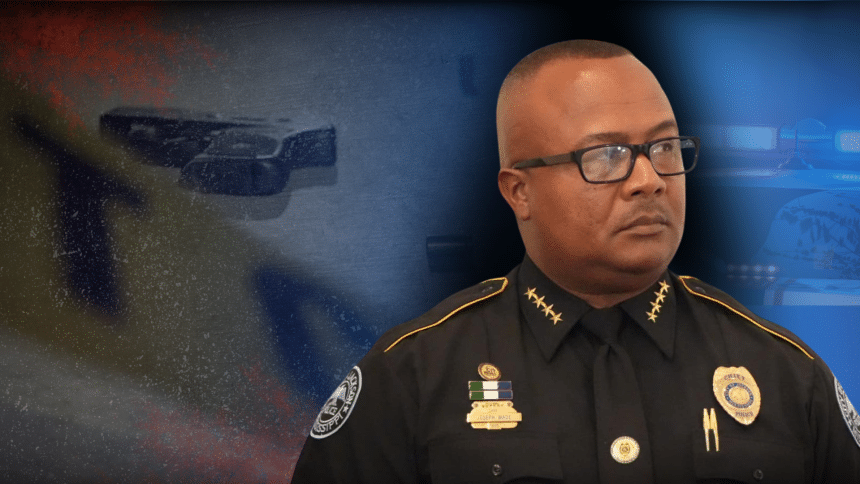Mississippi’s capital city has long stood in a dark, red-hued spotlight marred by bloodshed on its streets.
Jackson has worn an unenviable crown of America’s highest per capita murder rate since 2021. But violent crime is slowly, yet steadily, dropping in The City with Soul.
Total homicides have dropped 44% compared to July of 2024, with the city’s police department still boasting a remarkable 90% clearance rate.
A new administration under Mayor John Horhn has reignited vigor amongst law enforcement leaders like JPD Chief Joseph Wade. Guardrails that previously stood in the way of proactive policing are being stripped away. Or as Horhn put it at a recent city council meeting, “the handcuffs are off” of his city’s force.
Wade has held the mantle of Jackson’s top cop for nearly two full years since being appointed by former Mayor Chokwe Antar Lumumba in August of 2023. The 30-year JPD veteran is the first to admit that quieting the city’s streets will be a challenge marked by storms, but aligned cooperation at multiple levels could be a gale force wind in his department’s sails.
“We’ve been talking about these things for years,” Wade said about initiatives that will boost his department’s capacity to fight violent crime.
“But now under the leadership of Mayor Horhn, the city council, the state, (Department of Public Safety) Commissioner (Sean) Tindell, (Capitol Police) Chief Bo Luckey, now we’re going to bring them to fruition. The beneficiary of that is not Chief Joe Wade, it’s the city of Jackson.”
The proverbial potholes on the road to public safety are coming from many directions, as Wade explained, but his clear-cut top priority is a full-scale assault on Jackson’s violent crime problem.
Wade says there are as many as 30 gangs active within city bounds, a problem that has grown considerably worse in recent decades. A humming underground drug trade and human trafficking market is deeply rooted in Jackson and is largely operated by gang outfits, much like other major cities.
The I-55 corridor that runs through the heart of Jackson is a major vein for these illicit economies and can bring crime from other gang-heavy metros like Memphis, offering compounding challenges for law enforcement leaders.
But the first step to solving a problem is admitting you have one. Wade isn’t hiding from the issue, even if those operating as part of it are hiding from him.
The chief recently approached the Jackson city council with a proposal to limit or ban the wearing of ski masks on public premises, calling it a growing trend that’s more public safety snarl than fashion statement.
He also pointed to momentum building in the JPD intelligence unit, an effort that will help investigators begin to drill into the “who” behind the “what.”
“That’s the way you address crime,” Wade said of improving intelligence capabilities. “I love traditional patrol, but we have to have more of a drill-down focus on our bad actors.”
But higher quality data would mean little without more boots on the ground. Mayor Horhn has said since his July 1 inauguration that he wants to boost the city’s total force, which includes Capitol Police, to 500 officers. Currently, Jackson’s two police units combine for around 425 officers.
Other efforts include JPD’s recent assimilation into the FBI’s national crime database NIBRS, a comprehensive repository that immediately streamlines reporting and analysis work.
Mayor Horhn has pointed to Jackson’s potential as the engine of the Magnolia State, that “as Jackson goes, the state of Mississippi goes.” Horhn, Wade, and other leaders from the city, county, state, and federal levels are ready to get going.
“My priority is violent crimes in our community,” Wade concluded. “I don’t care who it is, I want to stay laser focused on getting these violent offenders out of our community that are robbing people, that are shooting people, that are carjacking people, and that are killing people. They have my full attention.”








